The steep slopes of the mount Batur push us away towards the east of the island. Our way stops when the ocean starts, somewhere not far from Amen, in the small hamlet of Jemeluk. The tourist development broke through the calmness of the fishermen villages which stretch out along the coast. Because of a ship: the Liberty that ran aground at less than 50 meters from the pebble beach of Tulamben. An artificial reef that coral fauna and flora quickly adopt for a breathtaking result. Red gorgons and fire corals proudly dance on the shapeless metallic remnants. Sometimes tinsel-decorated Christmas tree and sometimes heap of life-shining ferrous remains. Some flipper-kicks further, a diffuse light spreads through the gaping holes of the ship. We swim into what the lower deck formerly was. Wide-eyed, we get each drop of life. Endless navigation between the imposing size of the smashed-up metal sheets and the delicate and chiseled details of the reef life.
My underwater wonder is so great I succeed in convincing my family to stay an extra day and dip into the big blue. Introduction to scuba diving into the swimming pool of the hotel then departure for the wreck. Most of them feel the fear of the unknown mixed with a ferocious urge of swimming with the inhabitants of the world of silence. Each one will keep in mind an indelible memory of what was their first dive. And even those for who it's not their first bathing with bottles, the enthusiasm is the same. Maravilloso ! Increible ! Will be the two first words which will say Spanish partner immediately getting out of the water.
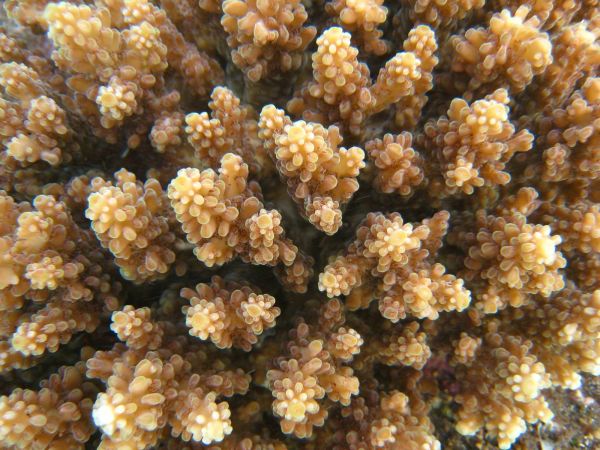





Keyword - animal kingdom -
Tuesday 19 August 2008
the breathtaking wreck of the Libery
By dorian on Tuesday 19 August 2008, 19:51 - RTW2-Indonesia
Saturday 26 July 2008
on the earth and into the water at St Lucia
By dorian on Saturday 26 July 2008, 08:19 - RTW2-South Africa
How to reconcile the visual hunt of terrestrial sometimes antediluvian-looking animals with the urge of putting on a mask and a snorkel to spy on the submarine critters and all of that within the same day? South Africa possesses the answer and haven't finished to surprise us on its diversity.
We arrive in the village of St Lucia where we land up in a great guest house called Blou house backpacker. At the bottom of the garden, mongooses argue over the passion fruits the vervet monkeys have wasted.
St Lucia and the eponymous lake draw a large estuary – the largest one in Africa – propitious for wildlife. Birds and mammals live in this park, encircling the lake. The savannah vanished and trees grew up. In spite of the change of habitat, a variety of animals succeeded in adapting. Rhinoceros, kudus, leopards, zebras and wildebeests took up residence in this luxuriant land. The avowed goal of the park's managers is to recreate the former waves of animals migrations when wildebeests and the others ran away the Lebombo mountains to move towards the wetland of St Lucia.
Before getting in the park, at the end of the estuary, the owner of the guest house has promised us hippopotamuses. Better to trust local people than the paper guides, he wasn't wrong.




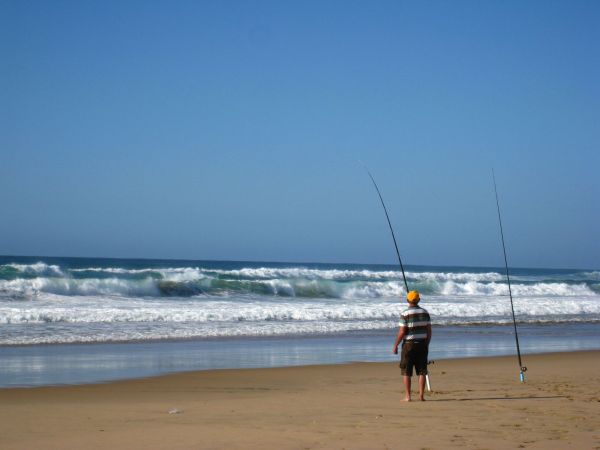
following this starter, we dash off to cape Vidal, 35km from the village. The owner, him again, announced this thing to us: « on the way to cape Vidal, you'll see every kind of animals including rhinos, as soon as you arrive at the end of the road, you slip mask and snorkel on to see colourful reef fish before driving back to St Lucia ». His speech sounded like the tempting caption of a tourist brochure. And yet, he was right again.
Underwater:




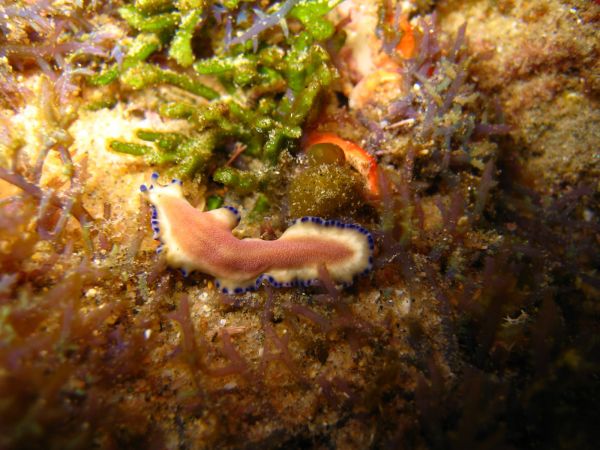





and a few hours later, on the earth:




St Lucia, one of the good finds of our South African journey.
Friday 25 July 2008
the hyenas in action at Hluhluwe-iMfolozi
By dorian on Friday 25 July 2008, 21:08 - RTW2-South Africa
At the beginning of our trip, while our eyes and memory were virgin of pictures of savannah and its fauna, A South-African, met on the Waterberg plateau in Namibia praised us the beauty and the high concentration of animals clustered in the Hluhluwe-iMfolozi park ( Zulu word pronounced Chluchluwi – Imfolozi). This name engraved on our log book and here we are now.
a few minutes after crossing the automatic barrier, several engine-stopped jeeps are crammed in the middle of the road. We switch off the engine and without seeing the scene, we recognize a characteristic sly cry. A lion is not far but about ten cunning hyenas succeeded in pinching a chunk of an antelope's carcass the predator had hunted. A laugh to flout it.
the bush sways. 2 hyenas appear, the loot in the mouth. Not at all disturbed by the human flock pressed against the protective guardrail of the jeeps, the 2 protagonists followed by some greedy and opportunistic fellow members cross the road before putting down the bloody carcass on the tarmac. One of females will finally have the last word and move away at the edge of road to enjoy its meal by dint of dreadful noises. Cracking sounds provided by a frighteningly powerful jaw.




After this morning firework, the day will be more dull despite the constant pleasure to watch every bush and every branch in the hope of flushing out the presence of an animal.



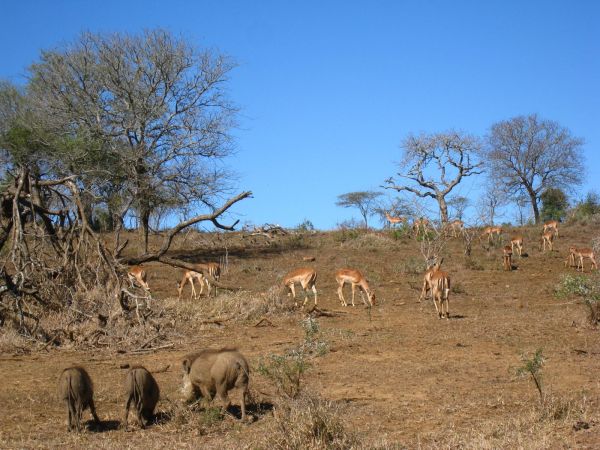





« previous entries - page 2 of 7 - next entries »












































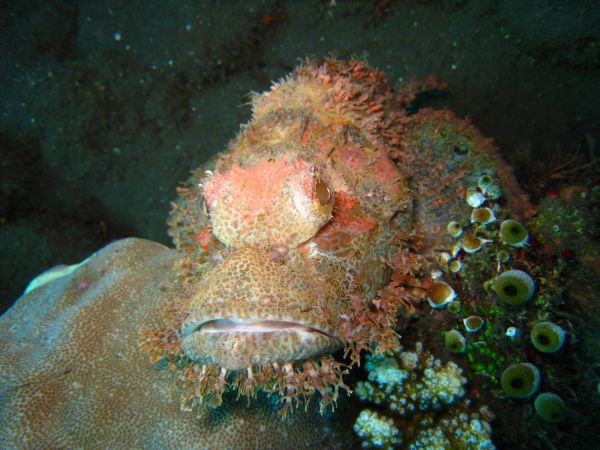














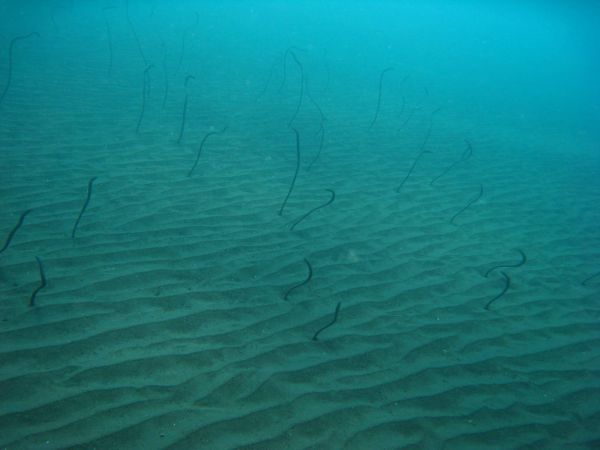





 visits
visits